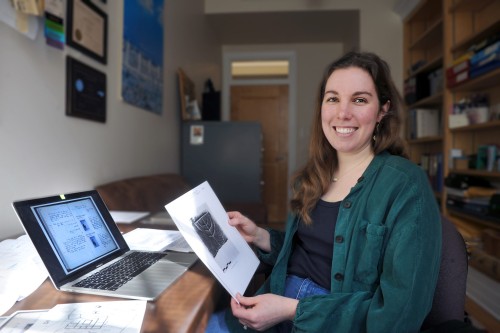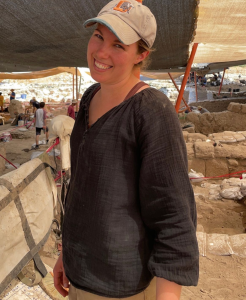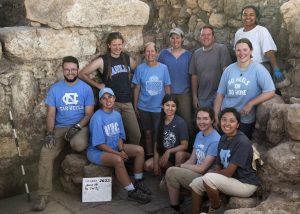Jocelyn Burney: Digging into the lives of ancient Jewish communities
Jocelyn Burney does amazing work for DLL's Correctional Education program as well as across Carolina.

Ph.D. student Jocelyn Burney got hooked on archaeology as an undergraduate at Carolina. (by Donn Young)
Religious studies Ph.D. student Jocelyn Burney relishes the public humanities aspect of her graduate work — from contextualizing a pottery exhibit in Carolina Hall to teaching the Hebrew Bible at a Raleigh women’s prison to supervising the work of undergraduate students at an archaeological dig in Israel.
Jocelyn Burney is used to getting up early. Really early. For the last 10 years, her summer mornings have begun promptly at 4 a.m. as an area supervisor for an archaeological dig at Huqoq in Israel’s Lower Galilee.
Burney is a Ph.D. student in religious studies who got hooked on archaeology as a 19-year-old undergraduate at Carolina when Kenan Distinguished Professor Jodi Magness first took students to Huqoq. (Magness is now her dissertation adviser.)

summer. (by Jada Enoch/Chrissy Stamey)
After traveling to the site and setting up shade tents, work begins around 5 a.m. to avoid the blistering heat. There’s a morning respite for breakfast at 8 a.m., then another fruit/hydration break affectionally called “elevensies” at 11 a.m. Burney supervises a group of students — teaching them, taking photographs, helping to document the excavation — as the team continues to unearth nearly 1,600-year-old mosaics in an ancient Jewish synagogue. It’s intense, physical work that wraps up around noon each day. Afternoons for students involve lectures and lab work — washing and cleaning pottery — while Burney spends the time writing up reports of the day.
“At the beginning of the season, most of them have never been on a dig before,” said Burney, a native of Morristown, New Jersey. “They require really close supervision. But it’s fun to watch them grow in confidence by the end of the season. At that point, it’s only been four weeks, but they’ve been digging for eight hours a day, six days a week. They’ve been sweating together, side by side, and they love it.”
Burney will head back in June for another season, after graduating in May with her Ph.D. (She successfully defended her dissertation on March 28.)
She has a passion for public humanities work, and several UNC fellowships are supporting her research. She has a Maynard Adams Fellowship from Carolina Public Humanities and is the inaugural Uhlman Fellow in Jewish Studies Public Humanities, supported by CPH and the Carolina Center for Jewish Studies.
As part of her Adams Uhlman Fellowship, Burney is working on a project to redesign a display case of ancient pottery on the first floor of Carolina Hall. The pottery, excavated from Tel Arad, Israel, in the northern Negev desert in 1962-1967, was brought to UNC by Bernard Boyd, a member of the excavation team and a founding member of the department of religious studies.
“This is something at the University that belongs to the public. But it’s been sitting here collecting dust. I want to research the history of this collection and to tell the story of how it got here,” said Burney, whose work has taken her to Boyd’s papers in the Southern Historical Collection. “I created a paper trail that traces the discovery of those pots and their shipment by boat to Wilmington and then transport by train to Chapel Hill in September 1969.”

is pictured back row, center, beside her dissertation advisor,
professor Jodi Magness. (by Jim Haberman)
Burney is also the recipient of a Dean’s Distinguished Dissertation Award given by The Graduate School. Her dissertation sheds new light on the religious lives of diaspora Jews in mainland Greece, the Aegean and western Turkey by analyzing the archaeological remains they left behind. She is specifically focusing on the funding, building and maintaining of synagogues over multiple generations.
“How do we think about these Jewish communities in relationship to their homeland? None of the texts or documents they produced survived to us today, so I am ‘excavating’ in the archives — looking at old field notebooks and using my training as an archaeologist to decode all of that,” she said. “These were not just static structures. What I’m finding is that the day-to-day practices of funding and building and maintaining these synagogues was a really integral part of their identity and religious life, generation after generation.”
Burney also puts on her public humanities hat with her teaching. Her “unconventional” assignment this semester is teaching a seven-week introduction to the Hebrew Bible at a women’s prison in Raleigh through the Correctional Education Program in UNC’s Office of Digital and Lifelong Learning.
“The students are [very engaged], and I’m really happy to be there,” she said. “I have 18 students ages 18 to 70, and they ask great questions and are very receptive.”
Her parting advice for graduate students at UNC? “Be interdisciplinary. Seek out classes and relationships outside your home department. That has really benefited me.”
In her free time, Burney enjoys experimenting with homebrewing and fermentation with her husband, David, and taking long walks with their dog, Pella, a beagle mix who is named after an archaeological site in Jordan.
After her summer work at Huqoq, she will head to the University of Missouri, where she will be an assistant professor of ancient Mediterranean religion.
“We’re excited about the future and new opportunities, but it will be bittersweet to leave Chapel Hill.”
(Originally posted April 4, 2023 By Kim Spurr ’88, College of Arts and Sciences)
CATEGORIES Correctional Ed | Homepage News | Lifelong Learning
